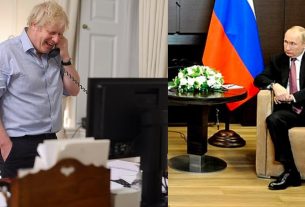The prime minister said the £16.5 billion boost to defence spending will restore the UK as Europe’s top maritime power with massive investment in cyber-warfare, drones, laser weapons and space programmes.
It also signals a marked threat to the UK’s overseas aid budget – a major part of which is to prevent and avoid conflicts – given Boris Johnson repeatedly failed to commit to the current 0.7% of GDP funding, despite it being a Conservative election manifesto pledge.
Today’s announcement will boost the UK’s defence budget – currently £41.5 billion per year – by around £5 billion each year when accounting for a previous commitment to an above-inflation annual increase to the defence budget. It represents a 10-15% surge per-year on defence spending over the course of this parliament.
The extra £16.5 billion over four-years on defence spending is over four-times more than the £4 billion pledged yesterday to combat climate change, pollution and usher in a green-revolution under the PM’s 10-point plan.
‘Once-in-a-generation modernisation of our armed forces’ – PM
Johnson, self-isolating in Number 10, addressed the Commons by videolink (as he did for yesterday’s PMQs) and described the current international situation as “more perilous and intensely competitive than at any time since the cold war.”
The prime minister said: “Everything we do in this country – every job, every business, even how we shop and what we eat – depends on a basic minimum of global security.
“Our people are sustained by a web of lifelines, oxygen pipes that must be kept open – open shipping lanes, a functioning internet, safe air corridors, reliable undersea cables, and tranquillity in distant straits.”
The increase in spending is necessary to ensure the UK’s place on the global stage, said Johnson, arguing that now is the right time to “press ahead” with this “once-in-a-generation modernisation of our armed forces”.
It is hyped as the biggest increase in defence spending since the Cold War and will make the UK the second biggest contributor to NATO, after the US.
Johnson said the spending will “restore Britain’s position as the foremost naval power in Europe”. The army is to be reshaped for “networked warfare”, special forces will be strengthened and the RAF will have a new fighter system able to “defeat any adversary in air-to-air combat” through use of artificial intelligence and drone technology.
Military research and development will get a £1.5 billion investment while other plans include a “space command” that will be ready to launch a UK rocket by 2022.
Starmer challenges PM to honour his pledge on aid budget
Labour leader Keir Starmer asked Boris Johnson where the extra £16.5 billion will come from and challenged the PM to honour a “very clear” Conservative manifesto pledge to maintain the aid budget at 0.7% of GDP.
Johnson insisted the “biggest package of support for our services since the cold war” has “absolutely no relation to discussion about overseas aid.”
Reports this week suggest the Treasury is looking to slash the overseas aid budget by billions to just to 0.5% of GDP – the pandemic’s impact on the economy means the aid budget is already £2.9 billion down.
When pressed by Conservative MP Andrew Mitchell, the former development secretary, as to whether Johsnon would commit to the 0.7% target – which Mitchell said would stand the PM “in very good stead when he assumes the chairmanship of the G7” – Johnson failed to do so. The PM then reasserted that “this statement is about our defence and security and there’s no read-across to any other issue.”
Johnson did take the opportunity of the defence spending announcement to try and rekindle his relationship with the devolved countries – which was further damaged by remarks made earlier this week – with the PM saying the defence spending announcement will “spur a renaissance of British shipbuilding across the UK…guaranteeing jobs and illuminating the benefits of the union in the welder’s torch.”




